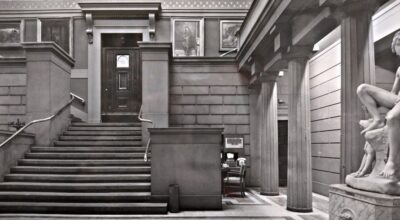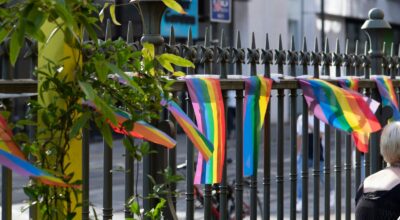In an art gallery, a toddler balances on a row of low sponge tiles, a baby reaches up to the light fittings in the ceiling and a small girl puts a finger to her lips and creeps quietly around a corner so as not to wake the giant painting of a lion. Children participate in art galleries in a myriad of ways that are “sometimes predictable, sometimes completely surprising” (Macrae et al)
Since September 2019, a team of arts and early years practitioners and researchers have been meeting at Manchester Art Gallery to co-design a new gallery for families. Until March 2020 we met regularly in the Gallery to share research and experiences that helped us think about the space. We looked at artworks that might be exhibited, we followed routes around the gallery that children had taken before us and we shared examples of nursery visits.
When the Gallery shut during the initial Covid-19 lockdown in March, building work had already begun to open up the space. Heavy shutters that had stopped the light from pouring in were pulled back, changing the quelled, quiet, low light gallery into a sunlit, open space. With lockdown temporarily closing the Gallery doors, we all held enough enthusiasm to continue meeting. We turned to Zoom, like so many other people around the world. Throughout the conversations a vision began to emerge of how values, interactions and collection artworks might work together in the new space.
The design of the space will be flexible to enable different organisations to deliver public health and education sessions and services. A series of movable screens and functional furniture will be in the space so that we can create new zones and configurations of furniture to suit needs. You can rest, play, feed, drink, watch, follow, share, create, talk, move, draw, listen. In considering the gallery as a holistic experience, we imagined the space as a base or nest from which the families can explore the rest of the Gallery. As soon as it is safe to do so we will begin to deliver a varied creative programme in the space for children, parents, carers and the people who work so hard to support families across Manchester.
The artworks in the space have been selected by our interdisciplinary group and support city wide agendas that aim to improve the life chances of children in Greater Manchester. Last week we installed a selection of bonbonnieres, these little 18th Century pots, originally filled with sweets or breath mints, are colourful and depict fanciful animals that have an almost cartoon like quality that may resonate with younger children. Yet the contents that once lay inside would have been cut from plantations by the hands of enslaved people. Sugar, in all its sweetness, is intrinsically linked to Britain’s colonial history. Sections of a poem by Tina Otito Tamsho-Thomas contextualise the bonbonniere as a symbol of enslavement legacy, sugar trade history and British colonialism. Today, excess sugar consumption sits at the heart of the healthy eating agenda, a key priority area for local early years providers. You can read more about the work we have been doing with MMU Education and Social Research Institute and our research into the bonbonnieres in the recent iJade article.
We would like to thank our partners for their continued support; as a team we have a respect for children and families and a desire to make society a better place, that coupled with a commitment and generosity of spirit has meant that our family programme is more impactful than ever.
Sure Start
Manchester health Visiting Team
Tiddlywinks Nursery Group
Martenscroft Nursery School and Children’s Centre
MMU (Children and Childhood Research Group)
The Whitworth (Early Years)



